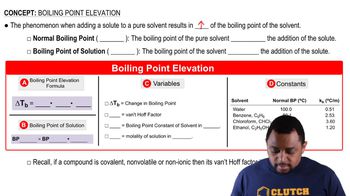Boiling Point Elevation definitions Flashcards
 Back
BackBoiling Point Elevation definitions
1/15
Terms in this set (15)
- Boiling Point ElevationPhenomenon where adding a solute to a solvent increases the boiling point of the solution.
- Normal Boiling PointThe boiling point of a pure solvent before any solute is added.
- Boiling Point of SolutionThe boiling point of a solvent after a solute has been added.
- ΔTbThe change in boiling point due to the addition of a solute.
- Van't Hoff FactorA factor representing the number of particles a solute forms in solution.
- KbThe boiling point elevation constant of a solvent, measured in °C/m.
- MolalityConcentration of a solution expressed as moles of solute per kilogram of solvent.
- Colligative PropertiesProperties of solutions that depend on the number of solute particles, not their identity.
- Covalent CompoundA compound with a Van't Hoff factor of 1, typically non-volatile and non-ionic.
- Non-volatileA substance that does not readily evaporate into a gas under existing conditions.
- Non-ionicA compound that does not dissociate into ions in solution.
- ElectrolyteA substance that dissociates into ions in solution, affecting the Van't Hoff factor.
- WaterA common solvent with a Kb value of 0.51 °C/m used in boiling point elevation.
- BenzeneA solvent with a Kb value of 2.53 °C/m used in boiling point elevation.
- ChloroformA solvent with a Kb value of 3.60 °C/m used in boiling point elevation.


